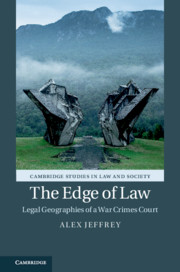Book contents
- The Edge of Law
- Cambridge Studies in Law and Society
- The Edge of Law
- Copyright page
- Contents
- Acknowledgements
- Abbreviations
- Chapter One The Edge of Law
- Part I Producing the Edge of Law
- Part II Politics at the Edge of Law
- Part III Contesting the Edge of Law
- Chapter Six Rules of Law
- Chapter Seven Entrance Strategies
- Chapter Eight Conclusion
- Bibliography
- Index
- Cambridge Studies in Law and Society
Chapter Eight - Conclusion
from Part III - Contesting the Edge of Law
Published online by Cambridge University Press: 11 December 2019
- The Edge of Law
- Cambridge Studies in Law and Society
- The Edge of Law
- Copyright page
- Contents
- Acknowledgements
- Abbreviations
- Chapter One The Edge of Law
- Part I Producing the Edge of Law
- Part II Politics at the Edge of Law
- Part III Contesting the Edge of Law
- Chapter Six Rules of Law
- Chapter Seven Entrance Strategies
- Chapter Eight Conclusion
- Bibliography
- Index
- Cambridge Studies in Law and Society
Summary
The Edge of Law is a study of the relationship between (and entanglement of) law and society in a post-conflict, state-building scenario. I have argued that studying the establishment of war crimes trials at the Court of Bosnia and Herzegovina helps explain the limits to legal redress and the subsequent challenges of using law as an instrument to establish justice after conflict. Following Galligan, the book directly engages with two facets of the law and society field: understanding law as a social formation (tracing its origins, institutionalisation and performance) while also exploring its implications for other social formations (such as associative life, identity formation and understandings of citizenship).1 This analytical approach contributes to a growing field of research that has adopted a law and society perspective to examine the establishment and operation of international, humanitarian or transitional legal processes; instances in which the innovative or ad hoc nature of the institutions of law makes studying its social consequences all the more pressing.2 A particular focus has been placed on the social legacy of law, either by studying the effectiveness of a particular legal reform,3 measuring attitudinal changes brought about through a specific legal innovation4 or reflecting on the opportunities for popular participation and local agency in new institutions of law.5
- Type
- Chapter
- Information
- The Edge of LawLegal Geographies of a War Crimes Court, pp. 180 - 187Publisher: Cambridge University PressPrint publication year: 2019

